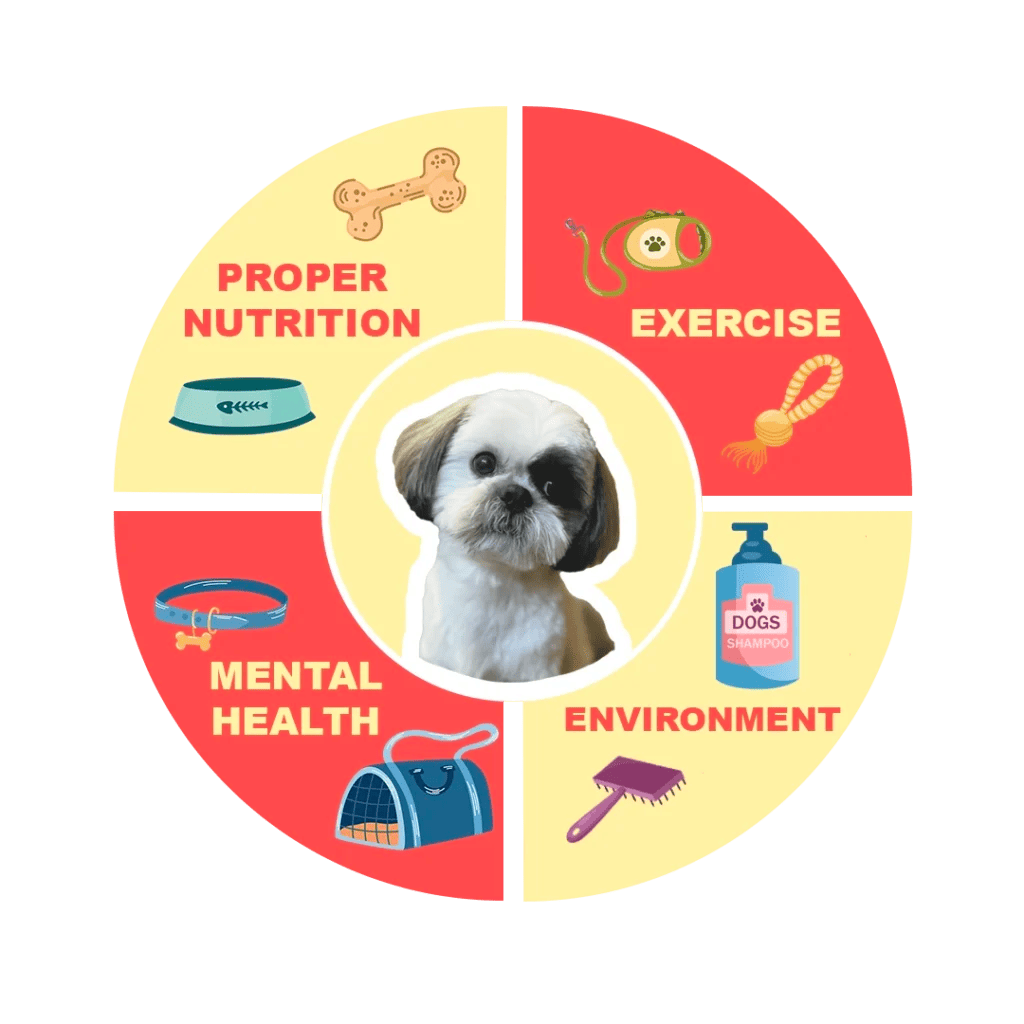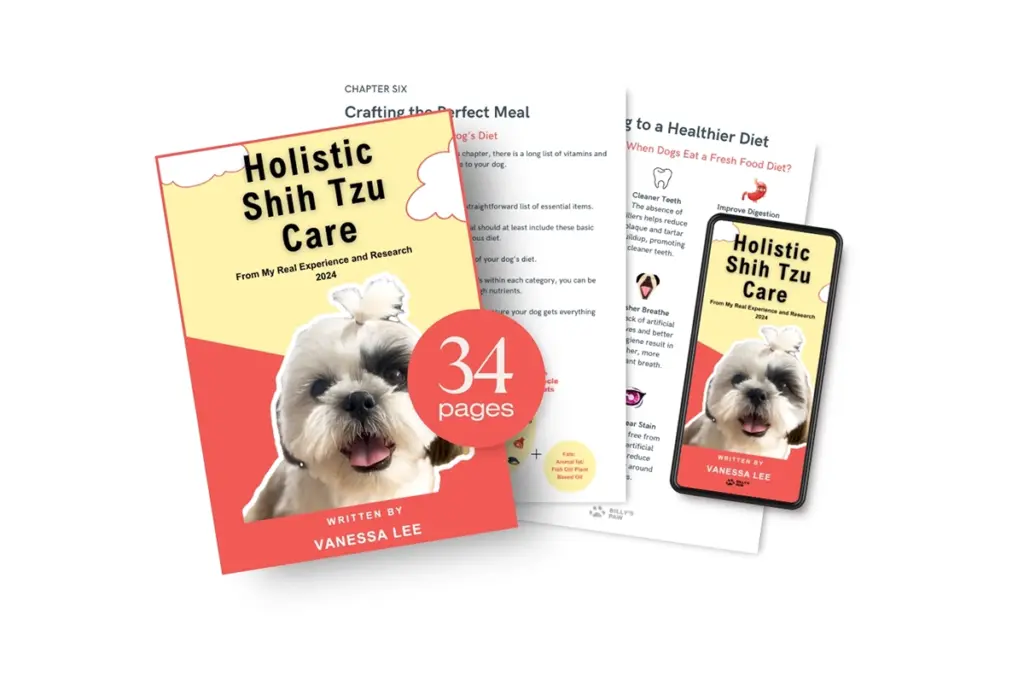5 Ways I Improve My Shih Tzu’s Gut Health Naturally (2025)
Studies show that over 70% of the immune system lives in the gut.1
That’s why I always prioritize my Shih Tzu’s gut health.
When my dog had tear stains, itchy skin, or tummy troubles, I started paying closer attention to what I was feeding him and how his digestive system reacted.
After trying different things, I condensed my experience into the following 5 natural ways that slowly helped strengthen his gut health.
I’m no expert.
I want to share what worked for me in case it helps your Shih Tzu too.
Key Takeaways:
- Fresh Food Over Processed Diets – A species-appropriate, fresh food diet supports gut health better than ultra-processed dog food.
- Limit Pharmaceutical Use When Possible – Medications like antibiotics and steroids can disrupt gut bacteria. Explore natural alternatives when appropriate.
- Feed a Variety of Foods – Feeding a variety of proteins and ingredients prevents food sensitivities and promotes a diverse, resilient gut microbiome.
- Use Herbal Remedies for Gut Support
- Holistic Care is More Than Just Diet – A well-functioning digestive system depends on stress management, toxin-free environments, and an overall balanced lifestyle.
NOTE: This article is intended to inform, not to replace any veterinarian medical advice. If you are in doubt, be sure to do a lot of research and consult with experts to find out what will work best for your dog.
1. A Fresh Food Diet
Let’s be honest.
No species thrives on ultra-processed food, and our dogs are no exception.2
When I first got Billy, I fed him kibble.
The result?
Tear stains, itchy skin, and constant digestive problems.
It didn’t matter if it was “grain-free” or “premium.” The problem wasn’t just the ingredients—it was the ultra-processing and all the synthetic vitamins.
The Food and Agriculture Organization of the United Nations report states:
“the results from studies show significant associations between dietary share of ultra-processed foods and the occurrence of disease.”
Quoted from Thixton, S. (2022, October 12). Is your pet’s food processed or ultra-processed? Truth About Pet Food.2
Switching to fresh, species-appropriate, gently cooked food made all the difference.
Suddenly, I had a dog who thrived rather than just “got by.”
A fresh food diet doesn’t have to be complicated.
Whether you choose a homemade raw, gently cooked, or pre-made fresh diet, the key is feeding real, whole food ingredients with minimum processing.
If you take nothing else from this article, take this: the foundation of a healthy gut starts with what you put in the bowl.
If you are interested in switching to a fresh food diet for your Shih Tzu, you can read more how I did it and what mistakes I made.
2. Minimize Pharmaceutical Use
I am not anti-vet, and I am definitely not against medication when it’s necessary.
But I’ve also learned that medications can harm the gut microbiome.3
Take antibiotics, for example. They kill harmful bacteria—but they also wipe out beneficial gut bacteria, leaving the gut vulnerable to digestive issues.
Steroids, NSAIDs, and even flea and tick preventatives can also disrupt gut flora.
Whenever vets prescribe Billy any medication, I now ask more questions.
Is this absolutely necessary?
Are there natural alternatives?
How can I support his gut during and after medication use?
When Billy did need any medications, I made sure to replenish his gut bacteria with probiotics and a detox protocol immediately afterward.
I also stopped using conventional flea and tick treatments filled with pesticides and switched to natural preventatives.
Medications should be a tool, not a crutch.
The goal is to create a strong immune system and a well-functioning digestive system so that my Shih Tzu doesn’t need pharmaceuticals in the first place.
Bonus: Download FREE Shih Tzu Herbal Tea Handbook ➔
3. Feed a Variety of Foods (Because Gut Health Thrives on Diversity)
Imagine eating chicken and rice every single day for years.
You’d probably end up with deficiencies, right? The same goes for dogs.
For years, pet food companies told us to feed one consistent food for life to maintain a “complete and balanced” diet.
This is my opinion on “complete and balanced” diet:
I believe that “complete and balanced” dog food is a misleading marketing term rather than a true measure of optimal nutrition. Here’s why…
But in reality, gut bacteria thrive on diversity.
I keep at least four proteins on hand, and I rotate daily.
I understand it may be hard for some busy, working pet parents. If you cannot do that, rotate at least once a week.
Since adopting a rotation diet, I’ve noticed:
Better digestion
Fewer food sensitivity
A stronger immune system
Dogs are resilient, but they weren’t meant to eat the same processed meal for years on end.
The less variety of food you feed for a longer period, the more likely the gut will develop a sensitivity to a protein.4
I once received a DM from someone whose Shih Tzu had been eating chicken for the past three years(!).
The dog was very itchy and had very dry skin.
When I suggested that he might be sensitive to chicken, the owner said, ‘But he’s been on it for the past three years without any problem!’
Similarly, my friend, who has two six-year-old Corgis that had been on the same kibble for their entire lives, tried switching them to whole food, and both dogs experienced very bad diarrhea.
They were horrified, and after just two days, they decided to switch back to kibble, convinced that fresh food was not something their dogs could eat.
Both of these situations show that limiting food variety does not benefit a dog’s gut and can lead to issues over time.
Diversity is key to optimal digestive health.
But cooking for your dog doesn’t need to be dreadful, here is how I prepare 5 days of food for Billy:
4. Incorporate Herbal Remedies (Because Nature Knows Best)
I used to think herbs were just “extra” things that didn’t do much.
But until I actively used them on myself and Billy, I realized how powerful herbs can be in boosting overall health.
Some of my favorite gut-supporting herbs include:
Slippery Elm: Soothes the digestive tract and helps with diarrhea or constipation.
Ginger: Reduces inflammation and supports digestion.
Chamomile: Eases bloating and relaxes the stomach.
BONUS: Nettle leaf is another very powerful herb for Shih Tzu that I love to feed Billy.
Instead of immediately reaching for medications, I now turn to herbs and natural remedies first.
One time, we went to the vet because Billy’s paws were inflamed.
The vet immediately assumed it was allergies and wanted to give him a Cytopoint injection.
Another time, we visited the vet to check on Billy’s scooting, thinking his anal glands might be full, but the vet found they were already emptied and suggested that Billy must be itchy, so she prescribed Apoquel.
After discussing with the vet, I decided to try home remedies first, and in the end, we didn’t need any of those medications.
For most of the mild and minor issues, I believe home remedies can address the problem better than medications.
Herbs don’t just mask symptoms, they work to restore balance from the inside.5
But I want to be clear—I’m not saying you should ignore your vet’s advice.
Instead, I believe in fostering an open dialogue where you can discuss health concerns and explore different solutions TOGETHER, making informed decisions that best suit your dog’s needs.
Bonus: Download FREE Shih Tzu Herbal Tea Handbook ➔
5. Take a Holistic Approach (Because Gut Health is More Than Just Food)
I believe holistic care doesn’t just mean using everything natural and organic—it means looking at the whole picture.
It’s about considering lifestyle, diet, environment, stress levels, and overall well-being as interconnected factors that influence your dog’s health.

Gut health isn’t just about diet—it’s about the entire lifestyle.
Stress, toxins, and lack of exercise can all throw off the gut balance.
Here’s some examples I do to maintain a healthy gut beyond food:
Daily sniff walks: Letting him explore and sniff naturally lowers stress levels.
Avoiding household toxins: I swapped chemical cleaners to natural and pet-safe options.
Minimizing vaccines and medications: I work with a holistic veterinarian to avoid over-vaccination.
Managing stress: Dogs pick up on our emotions. When I’m stressed, Billy gets anxious too. I try to keep his environment calm and predictable.
A dog with chronic stress or constant exposure to toxins will have weakened gut function—no matter how perfect the diet is.
I believe in looking at the whole dog, not just their symptoms like diarrhea or vomiting.
If You Are Committed to Give Your Shih Tzu The Best Care…
For a deeper dive into holistic care, check out my Holistic Shih Tzu Care ebook, where I share detailed guidance on nutrition, herbal remedies, and lifestyle tips to help your Shih Tzu thrive.
Get your copy today!








